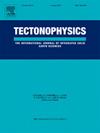Seismic structure of Iceland revealed by ambient noise Rayleigh wave tomography
IF 2.7
3区 地球科学
Q2 GEOCHEMISTRY & GEOPHYSICS
引用次数: 0
Abstract
As it is an ideal location for studying plume–ridge interactions, a clear image of the Icelandic upper mantle structure is necessary. We collect continuous seismic records from 164 stations and extract Rayleigh wave dispersion curves via the frequency-Bessel (F-J) transform method. Based on ambient noise tomography, we provide a new shear-wave velocity model of the Icelandic crust and uppermost mantle, extending to a depth of 120 km. The model is validated by the waveform simulation method and reveals extensive crustal low-velocity zones (LVZs) across both the neovolcanic and nonvolcanic zones of Iceland. These crustal LVZs may be attributed to elevated temperatures, partial melting, and lithological variations. A distinct LVZ beneath a depth of 60 km, mainly on the North American Plate, may correspond to Icelandic plume material. Additionally, hot plume material may be delivered to the crust through low-velocity conduits beneath the spreading mid-ocean ridge. There is a clear contrast between the uppermost mantle low-velocity zones (UMLVZs) in the western region and the uppermost mantle high-velocity zones in the eastern region, which may indicate asymmetric tectonic plates on both sides of the mid-ocean ridge. This asymmetry may be attributed to the multiple eastward jumps of the ridge systems. The eastern high-velocity body, meaning a cooler uppermost mantle than that of the western region, may act as a barrier to obstruct the eastward plume flow. Under plume–ridge interactions, plume material can affect crustal accretion and feed volcanic activity on the surface along the spreading Mid-Atlantic Ridge.
环境噪声瑞利波层析成像揭示冰岛地震结构
由于冰岛是研究羽桥相互作用的理想地点,因此有必要获得冰岛上地幔结构的清晰图像。我们收集了 164 个台站的连续地震记录,并通过频率-贝塞尔(F-J)变换方法提取了瑞利波频散曲线。在环境噪声层析成像法的基础上,我们提供了冰岛地壳和最上层地幔的新剪切波速度模型,该模型延伸至 120 千米深处。该模型通过波形模拟方法进行了验证,并揭示了冰岛新火山带和非火山带广泛的地壳低速区(LVZ)。这些地壳低速区可归因于温度升高、部分熔化和岩性变化。主要位于北美板块的 60 千米深度以下的明显低变质带可能与冰岛羽流物质相对应。此外,热羽流物质可能通过扩张的大洋中脊下方的低速导管输送到地壳。西部地区的最上层地幔低速区与东部地区的最上层地幔高速区之间存在明显的对比,这可能表明大洋中脊两侧的构造板块不对称。这种不对称可能是由于海岭系统多次向东跃迁造成的。东部高速体意味着最上层地幔比西部地区的地幔温度低,可能成为阻碍羽流向东流动的屏障。在羽流-海脊相互作用下,羽流物质会影响地壳增生,并为沿大西洋中脊扩张的地表火山活动提供能量。
本文章由计算机程序翻译,如有差异,请以英文原文为准。
求助全文
约1分钟内获得全文
求助全文
来源期刊

Tectonophysics
地学-地球化学与地球物理
CiteScore
4.90
自引率
6.90%
发文量
300
审稿时长
6 months
期刊介绍:
The prime focus of Tectonophysics will be high-impact original research and reviews in the fields of kinematics, structure, composition, and dynamics of the solid arth at all scales. Tectonophysics particularly encourages submission of papers based on the integration of a multitude of geophysical, geological, geochemical, geodynamic, and geotectonic methods
 求助内容:
求助内容: 应助结果提醒方式:
应助结果提醒方式:


